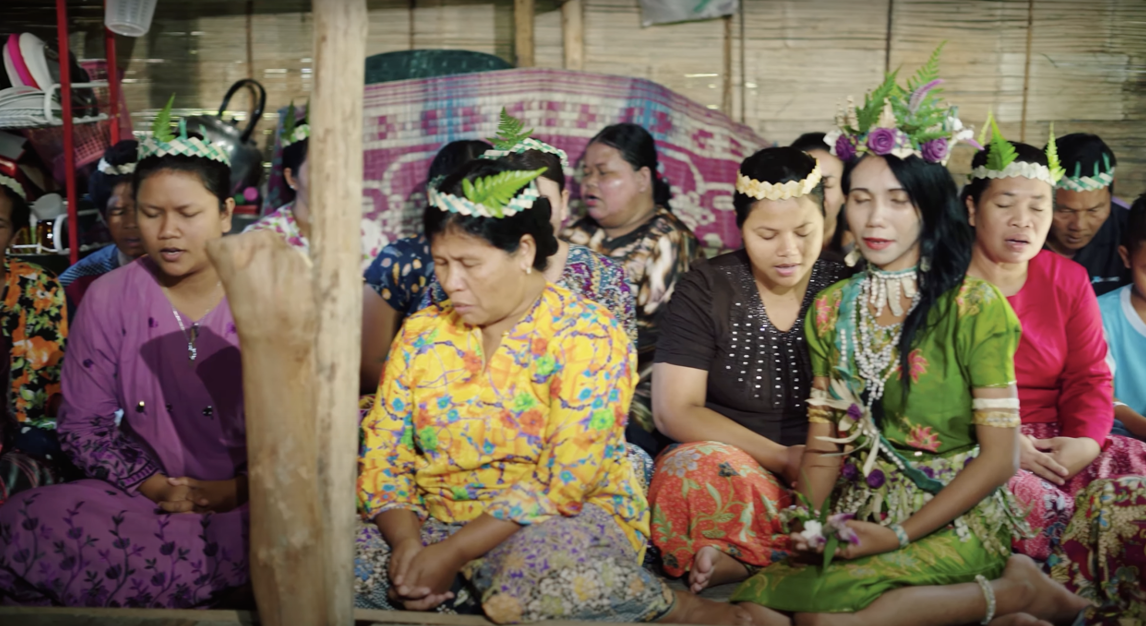The Occupied Palestinian Territory: An Interactive Dialogue on the High Commissioner’s Report
The 58th Session of the Human Rights Council
24 February - 4 April 2025
7th Meeting: Interactive dialogue on the High Commissioner's report (res 55/28) on the Occupied Palestinian Territories
26 February 2025
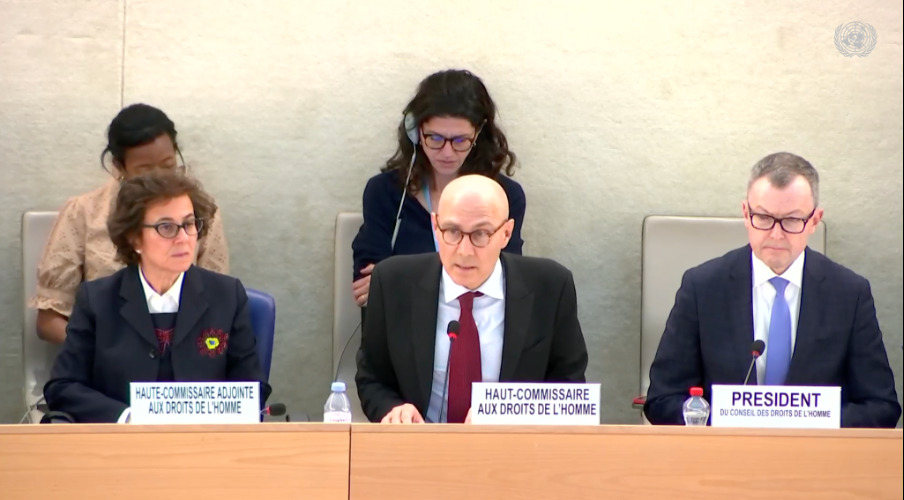
By Charlize Chen / GICJ
Executive Summary
On 26 February 2025, during the 58th Session of the Human Rights Council, country representatives, human rights organizations, and delegates engaged in an interactive dialogue on the High Commissioner’s report on the Occupied Palestinian Territories. The High Commissioner’s report, submitted under Human Rights Council resolution 55/28, provides an overview of the resolution’s implementation, developments relevant to the human rights situation in the Occupied Palestinian Territories, and the obligation to ensure accountability and justice.
The dialogue underscored the urgency of enforcing human rights in Gaza, even after the ceasefire, highlighting the ongoing genocide of the Palestinian people. Particular attention was given to the testimonies and experiences of those affected, especially women and children. The violence—unnecessary and disproportionate—has displaced tens of thousands, many of whom are in urgent need of humanitarian assistance.
Additionally, concerns persist regarding the Israeli justice system’s capacity and willingness to ensure accountability, uphold international standards of impartiality and independence, and take responsibility for continued human rights violations against the Palestinian people. Participants also reaffirmed the importance of a two-state solution, envisioning Israel and Palestine coexisting peacefully after the ceasefire, with East Jerusalem as the capital of Palestine.
Geneva International Centre for Justice (GICJ) supports the High Commissioner’s report and urges all parties to comply fully with international humanitarian law. GICJ also calls for the removal of all barriers to aid, an increase in humanitarian assistance, and an end to the blockade. GICJ reminds the international community that it must make every effort to secure a just peace in the Middle East, protect women and children, end the occupation, and safeguard the rights of the Palestinian people. Furthermore, GICJ emphasizes the crucial need for accountability and justice for violations committed.
Background
For more than 57 years, the Occupied Palestinian Territory—comprising the West Bank, including East Jerusalem, and Gaza—has remained under Israeli occupation, affecting all rights of Palestinians, including their right to self-determination. For over 17 years, Gaza has been subjected to blockades and closures amounting to collective punishment.
The High Commissioner began by mentioning the escalation in Gaza as of 7 October 2023, accusing Israeli forces, Hamas, and other Palestinian armed groups of having committed violations of international humanitarian law in Gaza, many of which amount to war crimes and other grave violations of international human rights law. Since then, tens of thousands of Palestinians have been killed in Gaza, the majority of whom were women and children. The High Commissioner quotes the Ministry of Health of the State of Palestine, that over 100,000 people have been injured, with an unknown number buried under rubble. From 7 October 2023 to 31 October 2024, the Office of the United Nations High Commissioner for Human Rights (OHCHR) verified 10,006 fatalities, including 4,470 children (45%) and 2,641 women (26%).
He expressed serious concerns about the Israeli justice system’s capacity and willingness to ensure accountability and comply with international standards of impartiality, independence, promptness, and effectiveness. To ensure that all Palestinians displaced from and within Gaza can return to their homes as rapidly as possible, the report urges measures to create safe conditions and provide adequate alternatives for those whose homes have been rendered uninhabitable. Furthermore, it calls for an end to the further unlawful displacement of Palestinians.
Summary of the Report of the UN High Commissioner of Human Rights
The UN High Commissioner’s report was submitted under Human Rights Council resolution 55/28 and covers the period from 1 November 2023 to 31 October 2024. It draws on human rights monitoring conducted by the Office of the United Nations High Commissioner for Human Rights (OHCHR) in the Occupied Palestinian Territories, as well as information from governmental sources, United Nations entities, and non-governmental organizations. During the reporting period, the conflict intensified, with Israel conducting extensive bombardments and ground operations across Gaza. Repeated displacement orders resulted in multiple mass forced displacements of Palestinians, exacerbating an unprecedented humanitarian crisis.
Violence and Genocide
In May 2024, after several months of intense ground battles in Khan Younis, Israeli ground forces stormed Rafah, the southernmost governorate in Gaza. On 6 October 2024, the Israeli military launched a large-scale military operation in North Gaza, including ordering the entire population to move southward even while it targeted exit routes, reportedly attacking civilians trying to flee and bombarding residential areas, hospitals, and sites sheltering internally displaced persons. The Israeli military also systematically besieged hospitals and nearly entirely blocked humanitarian access, trapping tens of thousands of Palestinians, the vast majority of whom had no access to food or other life-sustaining goods, and placing the entire population of the area at risk of death and displacement.
Blockade and Starvation
Israeli restrictions on aid and imports, the destruction of 68% of Gaza’s cropland, and the devastation of commercial infrastructure and the fishing industry have led to unprecedented levels of food insecurity. Multiple humanitarian organizations have accused Israel of "systematic aid obstruction," and serious concerns persist that it has deliberately inflicted starvation on Gaza’s population. Since 7 October 2023, at least 337 humanitarian workers have been killed, along with members of community and tribal groups guarding and distributing aid, forcing some organizations to suspend operations. The intentional targeting of humanitarian workers and civilians facilitating aid delivery constitutes a war crime under international law.
Unlawful Killings
The killing of Palestinians by Israeli security forces in the West Bank, including East Jerusalem, surged in October 2023 and continued at an unprecedented rate. Between October 2023 and October 2024, 601 Palestinians were killed, including 124 children, 11 women, and 3 persons with disabilities. Most fatalities occurred during Israeli military operations, including raids on Palestinian cities and refugee camps. Fewer than one-third were killed in attacks, alleged attacks, or exchanges of fire with Israeli forces; the majority were allegedly killed while throwing stones or Molotov cocktails—or while posing no threat whatsoever. Many of these killings likely constituted wilful killing, a war crime under international law in the context of occupation. On 29 December 2023, a 15-year-old Palestinian boy throwing stones at a military watchtower in Al-Eizariya, east of Jerusalem, was shot twice by a soldier inside the watchtower. As the boy shouted for help, the soldier shot him twice more, and he died shortly afterward. The use of lethal force in these circumstances was unlawful, appearing both unnecessary and disproportionate under international law.
Gender-Based Violence
The deepening humanitarian crisis in Gaza, repeated mass displacements, and the erosion of social protection systems have exposed Palestinians, particularly women and girls, to a greater risk of gender-based violence, including sexual violence. Local and international organizations’ capacity to provide support services for victims and victims’ capacity to access services have declined substantially. In parallel, the destruction by Israel of administrative and law enforcement apparatuses in Gaza has limited safe reporting avenues and access to justice for survivors. The destruction of the health system in Gaza and the blockade imposed by Israel have had a significant impact on the access of Palestinian women and girls to healthcare. The impacts on pregnant and breastfeeding women have been particularly severe, with an estimated 155,000 women facing critical challenges in accessing antenatal and postnatal care and reports of increasing numbers of pre-term and low-birth-weight babies.
Accountability
Concerns persist about the lack of effective investigation into allegations of torture or ill-treatment of Palestinians, including sexual violence, in Israeli detention facilities. Despite hundreds of testimonies, only a few investigations have occurred. The ongoing lack of accountability measures for serious allegations of international law violations resulting from these structural obstacles has raised serious doubts about Israeli authorities’ willingness and ability to conduct genuine investigations, as required by international law. While certain complaint channels exist for Palestinians living under the effective control of the Palestinian Authority, there is rarely any accountability for violations by Palestinian security forces. Throughout the reporting period, no progress was made in the trial regarding the alleged killing of activist and critic of the Palestinian Authority Nizar Banat by Palestinian security forces.
Interactive Dialogue
Opening Statements
Mr. Volker Türk, the United Nations High Commissioner for Human Rights, opened the dialogue by emphasizing that there is a critical inflection point in the crisis of the occupied Palestinian territories. He remarked how a fragile ceasefire is allowing humanitarian aid to be delivered, but it remains a tenuous moment in the ongoing conflict. At this time, the question of how to resolve this decades-old conflict and break the cycle of violence while ensuring accountability and justice for violations is crucial. Mr. Türk explained how, for more than 57 years, the people of Gaza and the West Bank have been suffocating under a system that denies them basic human rights, subjecting them to blockades and an inadequate standard of living.
He subsequently presented alarming statistics on the human rights crisis and the loss of human life, highlighting the unlawful killing of Palestinians, many of whom have been taken, held, and tortured. Throughout the conflict, more than 35,000 children have lost one or both parents. At least 277 UN staff members have been killed, as well as 200 journalists and media workers. Two-thirds of essential infrastructure has been destroyed, including homes, hospitals, schools, and the justice system. Additionally, there has been massive destruction of hospitals and civilian infrastructure. As a result, the human rights situation in the Occupied Palestinian Territories has deteriorated to an unprecedented extent, raising concerns over systematic violations of international humanitarian law regarding the conduct of hostilities, many of which amount to war crimes.
Mr. Türk concluded his opening statement by demanding the unconditional release of all hostages, emphasizing the continued suppression of the Palestinian people. He cited the 17 years of blockade and destruction, as well as the lack of accountability for actions addressed by the International Court of Justice and the International Criminal Court. As such, he called for an end to the killing of civilians, reports of torture and sexual violence, and the taking of hostages by these armed groups, which have resulted in severe human rights violations.
Participating Countries
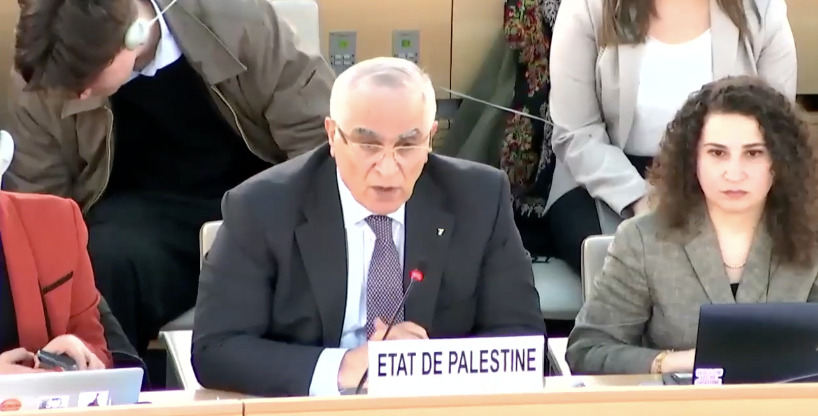
The floor was then given to Mr. Ibrahim Khraishi, a representative of the State of Palestine, who denounced the ongoing genocide in Palestine, emphasizing that it remains a serious and urgent concern. He specifically highlighted the targeting of journalists and the deliberate suppression of crucial information intended to conceal the heinous crimes being committed. He further reported that over 11,200 Palestinians remain unaccounted for, with the widespread destruction caused by the conflict making it even more difficult to locate displaced individuals. Additionally, more than 40,000 Palestinians have been forcibly displaced as a result of the ongoing violence.
He concluded his statement by calling on the international community to hold the perpetrators accountable and to reject any attempt to turn a blind eye to the injustices carried out by the occupying forces.
Subsequently, Mr. Akram Sa'ud Harahsheh of Jordan, speaking on behalf of the Group of Arab States (Arab Group), echoed similar concerns. He emphasized the need to establish a clear and consistent timeline of more than 50 years of occupation and injustice, arguing that only through this process can the international community fully grasp the extent of the violations and human suffering involved. He condemned Israel’s lack of cooperation and urged the international community to apply pressure on Israel to fulfill its obligations to investigate violations of international law.
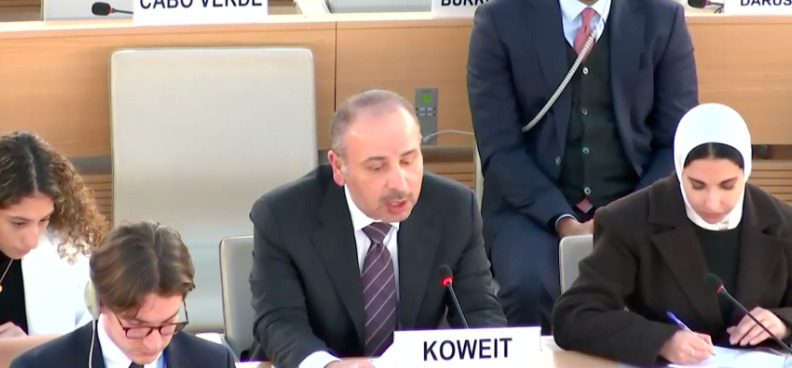
Afterward, Mr. Naser Abdullah H. M. Alhayen of Kuwait (on behalf of the Cooperation Council for the Arab States of the Gulf - GCC), spoke, discussing the destroyed facilities and ruined homes, lives, and livelihoods of the Palestinian people and large-scale attacks in west banks with disregard of civilians and violation of international law. He additionally applauded the efforts of Qatar, the United States, and Egypt to reach a ceasefire. He ended by urging for a two-state solution in which Israel and Palestine live side by side in peace.
Ms. Lotte Knudsen, representative of the European Union, reiterated the EU’s support for the mandated two-state solution. She emphasized the importance of continued cooperation with civil society and condemned the further escalation of violence from the West Bank into East Jerusalem. The EU stated that it remains committed to achieving comprehensive justice and lasting peace, pledging its continued support for a free Palestine.
Ms. Akosua Dedaa Okyere-Badoo, representative of Ghana (on behalf of the Group of African States – African Group), emphasized that the brutality of Israeli aggression in Gaza is unacceptable. She expressed the African Group’s appreciation for the High Commissioner’s report and reiterated its deep concern over the lack of accountability and the unprecedented brutality of Israeli forces in the West Bank.
She reaffirmed the centrality of justice in the Palestinian cause, emphasizing its historic struggle for independence with East Jerusalem as its capital. She implored Israel to fully comply with the rulings of the International Court of Justice (ICJ) and to support United Nations General Assembly (UNGA) resolutions on Palestine. Additionally, she condemned the ongoing atrocities in Gaza, stressing that accountability and adherence to international law are essential steps toward achieving lasting peace and security in the Middle East.
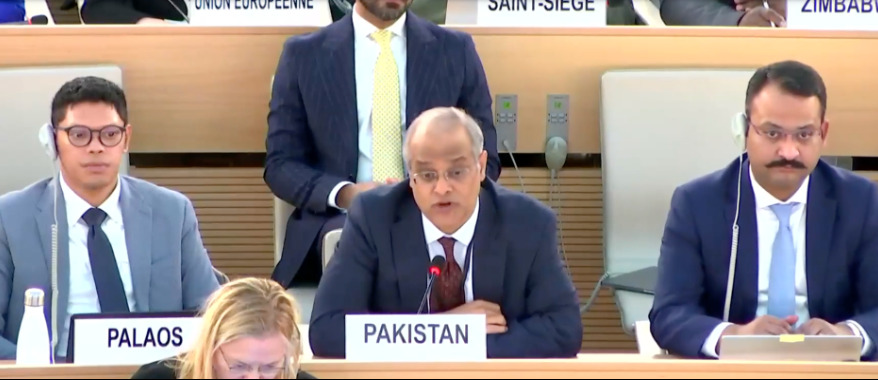
Mr. Bilal Ahmad of Pakistan, speaking on behalf of the Organization of Islamic Cooperation (OIC), expressed deep concern and discontent over the ongoing disregard for humanity, both before and during the reporting period. He strongly condemned Israel’s shocking crimes in the Gaza Strip and called for the full withdrawal of Israeli forces from the entirety of Gaza. He argued that no category of protection has been left unviolated and urged the international community to take immediate and effective steps to end the illegal occupation, in line with the International Court of Justice's (ICJ) advisory opinion of July 19, 2024.
The delegate of Saudi Arabia reaffirmed his country's commitment to the Palestinian cause and strongly condemned the escalating violations against the Palestinian people. He emphasized the absence of meaningful accountability for the perpetrators and the blatant disregard for human life, expressing deep concern over the ongoing situation.

The delegate of Australia echoed this sentiment, emphasizing that there can be no role for Hamas or any militant group in the future of Gaza and the lives of Palestinians. She reiterated the urgency for the international community to hold Israel accountable, expressing deep concern over the acceleration of illegal settler activity and the rapid expansion of Israeli settlements in the West Bank. She stressed that the protection of civilians must remain a priority.
The delegate of Ghana commended the resilience of the Palestinian people in retaining hope despite immense suffering and strife. He emphasized that the top priority should be fostering constructive dialogue and securing statehood for both Israel and Palestine. He further outlined the Palestinian struggle as being rooted in longstanding systemic oppression, stressing the imperative of recognizing the Palestinian people's right to self-determination, statehood, and fundamental human rights.
The delegate of New Zealand echoed the High Commissioner's call for accountability and urged all parties to uphold their responsibilities. She called for the unconditional release of all hostages, the unimpeded flow of humanitarian aid throughout Gaza, and good-faith negotiations toward a just and lasting peace based on the two-state solution.
Non-Governmental Organisations
Delegates of Non-Governmental Organisations drew attention to the violence perpetrated against Gazan children, a marginalized and often forgotten demographic within the conflict. Israel has committed and continues to commit genocide, which must be stopped. In support of the UN Human Rights Council and the International Criminal Court, they emphasized that human rights standards must be upheld. Despite restrictions on their staff, these NGOs continue to push forward and document human rights violations in Gaza. They advocate for the active bearing of witness to arbitrary arrests, horrific detainment conditions, killings, and unprecedented destruction.
The NGOs concluded their statements by demanding that the international community address the root causes of the conflict to ensure the effective protection of civilians. They also warned against the manipulation of language and called for organizations, delegates, and representatives to resist all efforts by both Israel and Hamas to spread fear or incite hatred through dehumanizing narratives.
Concluding Remarks
Mr. Volker Türk, the United Nations High Commissioner for Human Rights, delivered the final remarks of the interactive dialogue, stating that for more than 15 years, he has reported on and alerted the international community about the human rights situation in the occupied Palestinian territories and the institutionalized oppression of the Palestinian people. He highlighted the numerous and wide-ranging violations stemming from 57 years of military occupation and 17 years of blockade. Despite these recurring findings, he expressed that most of these findings have gone unanswered, emphasizing the need for urgent compliance with orders for provision and advisory opinion.
Mr. Türk concluded his remarks by urging the international community to ensure the ceasefire is held to protect civilians and to act in enforcing accountability through universal jurisdiction and reparations. He reminded delegates that the UN Human Rights Office will continue to work toward justice for every victim, strive to end the occupation, and, most importantly, work toward a future in Gaza where both Palestinians and Israelis can live with equal dignity and rights.
Position of Geneva International Centre for Justice
Geneva International Centre for Justice (GICJ) fully supports the High Commissioner's report and calls for the immediate withdrawal of Israeli armed forces from the Palestinian Occupied Territories. GICJ urges an end to the blockade and an increase in humanitarian assistance, particularly for Palestinian women and children, to help them rebuild their lives, which have been shattered by the occupation. Israel must be held accountable for the genocide committed against the Palestinian people and the ongoing human rights violations.
In light of the acceleration of illegal settler activity and the rapid expansion of Israeli settlements in the West Bank, the protection of civilians is paramount, and international law must be upheld. GICJ urges states to take immediate action, support the International Criminal Court, and back arrest warrants for those responsible for violations.
Finally, to ensure peace for the Palestinian people, GICJ supports the fundamental rights of the Palestinian people of self-determination. GICJ emphasizes the importance of continuous international monitoring to ensure that international law is respected and human rights are upheld and protected.
#HRC58 #humanrightscouncil #HRC #humanrights #ENDPERSECUTION #UnitedNations #GICJ#Geneva4Justice #GenevaInternationalCentreforJustice #Justice






